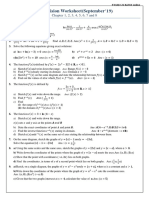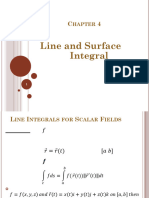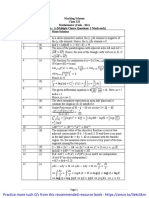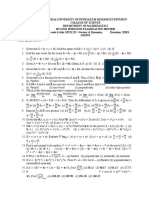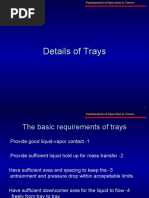Tutorial II MATH 222
Uploaded by
Yash ShuklaTutorial II MATH 222
Uploaded by
Yash ShuklaDepartment of Mathematics Tutorial 2
UNIVERSITY OF PETROLEUM & ENERGY STUDIES, DEHRADUN
Program B. Tech (Dept. of Chemical Engg. and Semester III
Dept. of Mechanical Engg. Branches)
Course Mathematics III Course Code MATH 222
Session July-Dec 2017 Topic Complex Variables-I
𝑧
1. Show that if 𝑓(𝑧) = 𝑧̅ the limit lim 𝑓(𝑧) does not exist.
𝑧→0
2. Test the continuity of the function at 𝑧 = 0, If 𝑓(𝑧) = 0 for 𝑧 = 0 and for 𝑧 ≠ 0, 𝑓(𝑧) is
a. 𝑅𝑒(𝑧 2 )/|𝑧|2
b. 𝐼𝑚(𝑧 2 )/|𝑧|
1
c. 𝑅𝑒 (𝑧) |𝑧 2 |
d. 𝐼𝑚(𝑧)/(1 − |𝑧|)
3. Let 𝑓 denote the function whose value is 0 when 𝑧 = 0 and for non-zero values of 𝑧,
𝑧 2
(̅̅̅̅)
𝑓(𝑧) = Show that 𝑓 ′ (0) does not exist.
𝑧
4. Show that |𝑧|2 is differential only at z=0
5. Show that if 𝑓(𝑧) = 𝑒 𝑧 , 𝑓′(𝑧) = 𝑒 𝑧 and if 𝑓(𝑧) = sin 𝑧, 𝑓′(𝑧) = cos 𝑧
6. Using Cauchy-Riemann equation show that 𝑓′(𝑧) does not exist at any point if
a. 𝑓(𝑧) = 𝑧̅
b. 𝑓(𝑧) = 𝑧 − 𝑧̅
c. 𝑓(𝑧) = 2𝑥 + 𝑖𝑥𝑦 2
d. 𝑓(𝑧) = 𝑒 𝑥 𝑒 −𝑖𝑦
7. Show that following functions are entire.
a. 𝑓(𝑧) = 3𝑥 + 𝑦 + 𝑖(3𝑦 − 𝑥)
b. 𝑓(𝑧) = sin 𝑥 cos ℎ𝑦 + 𝑖 cos 𝑥 sin ℎ𝑦
c. 𝑓(𝑧) = 𝑒 −𝑦 sin 𝑥 − 𝑖𝑒 −𝑦 cos 𝑥
d. 𝑓(𝑧) = (𝑧 2 − 2)𝑒 −𝑥 𝑒 −𝑖𝑦
8. Show that each of these functions are nowhere analytic
a. 𝑓(𝑧) = 𝑥𝑦 + 𝑖𝑦
b. 𝑓(𝑧) = 2𝑥𝑦 + 𝑖(𝑥 2 − 𝑦 2 )
c. 𝑓(𝑧) = 𝑒 𝑦 𝑒 𝑖𝑥
cos 𝑥+sin 𝑥−𝑒 −𝑦 𝜋
9. Construct the analytic function 𝑓(𝑧) = 𝑢 + 𝑖𝑣, if 𝑢 − 𝑣 = and 𝑓 ( 2 ) = 0.
2(cos 𝑥−cos ℎ𝑦)
10. Find the orthogonal trajectory of the family of curves 𝑥 4 + 𝑦 4 − 6𝑥 2 𝑦 2 = 𝑐𝑜𝑛𝑠𝑡𝑎𝑛𝑡.
11. Evaluate the following integrals
2 1 2
a. ∫1 ( 𝑡 − 1) 𝑑𝑡
𝜋/6 𝑖2𝑡
b. ∫0 𝑒 𝑑𝑡
∞
c. ∫0 𝑒 −𝑧𝑡 𝑑𝑡, 𝑅𝑒(𝑧) > 0
12. Evaluate the integral of 𝑓(𝑧) = 𝑦 − 𝑥 − 𝑖3𝑥 2 over the path C1 and C2 shown below.
13. Integrate following
a. ∫𝐶 𝑅𝑒 𝑧 𝑑𝑧, C the shortest path from 0 to 1 + 𝑖
b. ∫𝐶 𝑅 𝑑𝑧, C the parabola 𝑦 = 𝑥 2 from 0 to 1 + 𝑖
c. ∫𝐶 𝑒 2𝑧 𝑑𝑧, C the shortest path from 𝜋𝑖 to 2𝜋𝑖
d. ∫𝐶 sin 𝑧 𝑑𝑧, C the shortest path from 0 to 𝑖
14. Integrate 𝑓(𝑧) counterclockwise around the unit circle
a. 𝑓(𝑧) = 1/(3𝑧 − 𝜋𝑖)
b. 𝑓(𝑧) = 1/𝑧̅
c. 𝑓(𝑧) = sec(𝑧/2)
d. 𝑓(𝑧) = 1/(4𝑧 − 3)
15. Evaluate using Cauchy’s Integral formula
sin 𝜋𝑧 2 +cos 𝜋𝑧 2
a. ∮𝐶 𝑑𝑧 where 𝐶 is the circle |𝑧| = 3
(𝑧−1)(𝑧−2)
cos 𝜋𝑧
b. ∮𝐶 (𝑧 2 −1) 𝑑𝑧 around a rectangle with vertices 2 ± 𝑖, −2 ± 1
sin2 𝑧
16. Evaluate the integral ∮𝐶 𝜋 3
𝑑𝑧 where 𝐶 is the circle |𝑧| = 1
(𝑧− )
6
17. Evaluate the following
7𝑧−6
a. ∮𝐶 𝑧 2 −2𝑧 𝑑𝑧, C as shown
𝑒 2𝑧 1
b. ∮𝐶 𝑑𝑧, C consists of |𝑧| = 2, counterclockwise and |𝑧| = 2,
4𝑧
counterclockwise
1
c. ∮𝐶 𝑧 2 +1 𝑑𝑧, C, (i) |𝑧 + 1| = 1, (ii) |𝑧 − 1| = 1, counterclockwise
𝑧 2 +1
18. Integrate 𝑓(𝑧) = 𝑧 2 −1 Counterclockwise along
a. |𝑧 − 1| = 1
b. |𝑧 − 𝑖| = 1
c. |𝑧 − 1/2| = 1
d. |𝑧 + 1/2| = 1
19. Evaluate the line integrals
cos 𝑧
a. ∮𝐶 (𝑧−𝑝𝑖)2 𝑑𝑧 , for |𝑧 − 𝑝𝑖| = 6
𝑧 4 −3𝑧 2 +6
b. ∮𝐶 (𝑧+𝑖)3
𝑑𝑧 , for |𝑧 + 𝑖| = 6
𝑒𝑧
c. ∮𝐶 (𝑧−𝑖)2 (𝑧 2 +4) 𝑑𝑧 , for |𝑧 − 1| = 1
You might also like
- P3 JAN 21 Revision Worksheet All ChaptersNo ratings yetP3 JAN 21 Revision Worksheet All Chapters3 pages
- IIPUC-MATHEMATICSPREPARATORYQUESTIONPAPER_17a143d9208f477bbc360099702c7d26_19880No ratings yetIIPUC-MATHEMATICSPREPARATORYQUESTIONPAPER_17a143d9208f477bbc360099702c7d26_198806 pages
- AP Calculus BC Fall Final Exam 2024 (Mantle)No ratings yetAP Calculus BC Fall Final Exam 2024 (Mantle)9 pages
- Module-Ii Conformal Transformations and Complex Integration: (Jun-09, Dec-13/19, Jul-16/18/19)No ratings yetModule-Ii Conformal Transformations and Complex Integration: (Jun-09, Dec-13/19, Jul-16/18/19)2 pages
- EMT 2201 ENGINEERING MATHS IV ASSIGNMENT - 1No ratings yetEMT 2201 ENGINEERING MATHS IV ASSIGNMENT - 13 pages
- Department of Mathematics and Philosophy of Engineering MHZ3552 Engineering Mathematics II Assignment No.03No ratings yetDepartment of Mathematics and Philosophy of Engineering MHZ3552 Engineering Mathematics II Assignment No.034 pages
- MTF101A - Tutorial-13 - Complex AnalysisNo ratings yetMTF101A - Tutorial-13 - Complex Analysis2 pages
- Advanced Maths Graphing Techniques Practice Paper With Solutions Amended 640489ba99f95No ratings yetAdvanced Maths Graphing Techniques Practice Paper With Solutions Amended 640489ba99f9546 pages
- Naskah Soal TO-2 Matematika Minat - 2021No ratings yetNaskah Soal TO-2 Matematika Minat - 20216 pages
- Trigonometric Ratios to Transformations (Trigonometry) Mathematics E-Book For Public ExamsFrom EverandTrigonometric Ratios to Transformations (Trigonometry) Mathematics E-Book For Public Exams5/5 (1)
- Section - B (Attempt All The Questions) - 50 MarksNo ratings yetSection - B (Attempt All The Questions) - 50 Marks2 pages
- University of Petroleum and Energy Studies Examination, July 2020No ratings yetUniversity of Petroleum and Energy Studies Examination, July 20203 pages
- Engineering Failure Analysis: Y. Prawoto, M.A. YusofNo ratings yetEngineering Failure Analysis: Y. Prawoto, M.A. Yusof10 pages
- Caterpillar - Motoniveladora 24m - 02 - Plano ElectricoNo ratings yetCaterpillar - Motoniveladora 24m - 02 - Plano Electrico2 pages
- CH126P Chemical Engineering Thermodynamics Syllabus (Rev 3Q1920)No ratings yetCH126P Chemical Engineering Thermodynamics Syllabus (Rev 3Q1920)7 pages
- Name: Jave Jose M. Dela Cruz Section: BSCE 1-1 GradeNo ratings yetName: Jave Jose M. Dela Cruz Section: BSCE 1-1 Grade6 pages
- Ch-4 A Truly Beautiful Mind (Extra Q+A and Notes)No ratings yetCh-4 A Truly Beautiful Mind (Extra Q+A and Notes)4 pages
- 3a-Vlsi Lecture Transistors Wires Parasitics Chapter 3No ratings yet3a-Vlsi Lecture Transistors Wires Parasitics Chapter 3139 pages
- Vectors in 2 Dimensions Matching ActivityNo ratings yetVectors in 2 Dimensions Matching Activity3 pages
- A Proposed Spectral Form For Fully Developed Wind Seas Based On The Similarity Theory of S. A. KitaigorodskiiNo ratings yetA Proposed Spectral Form For Fully Developed Wind Seas Based On The Similarity Theory of S. A. Kitaigorodskii10 pages
- Semi Mobile Flashing Unit: Project Number 0470100100No ratings yetSemi Mobile Flashing Unit: Project Number 04701001003 pages
- MS For FOC Laying, Splicing, Termination, Testing and Commissioning Works50% (2)MS For FOC Laying, Splicing, Termination, Testing and Commissioning Works23 pages







